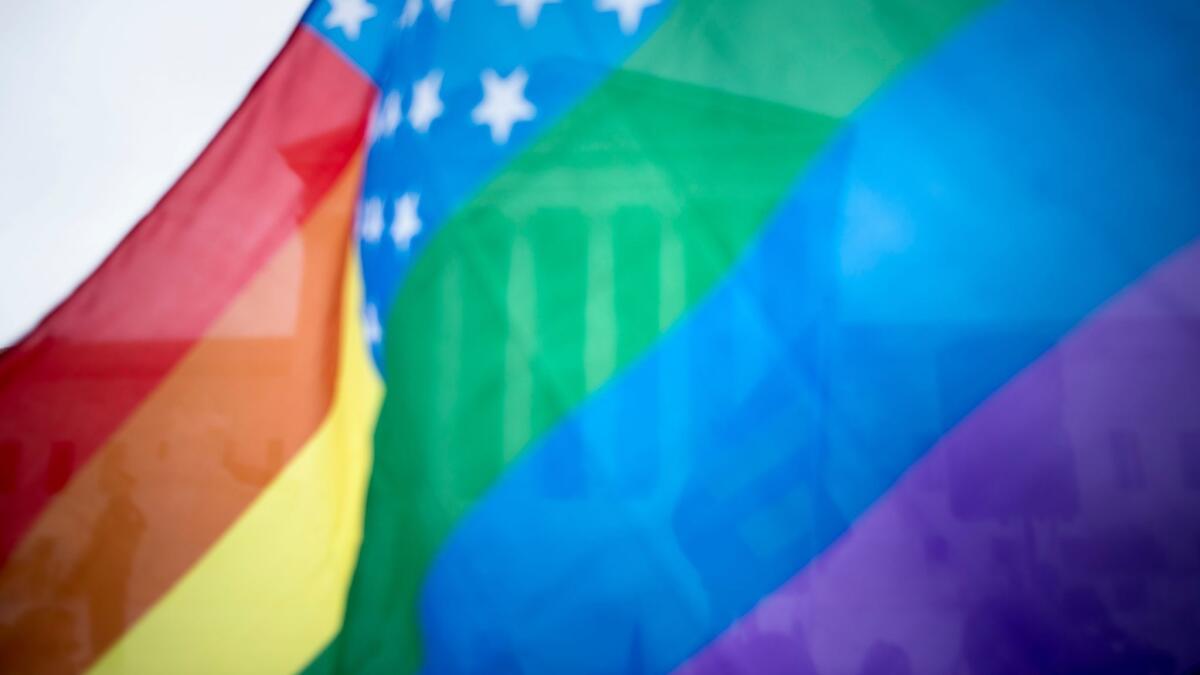Op-Ed: Three LGBTQ job discrimination cases could have wider consequences for everyone

- Share via
The Supreme Court last week took three cases that will determine whether Title VII, the part of the Civil Rights Act prohibiting discrimination in the workplace, protects lesbian, gay, bisexual or transgender employees. In each case — two involving a gay man and one a transgender woman — the plaintiffs clearly were terminated simply because of who they are. A loss would reverse decades of precedent and strip legal protections from millions of LGBTQ workers.
What may be less obvious, however, is how the Trump administration — in siding against the LGBTQ employees — is attacking sex discrimination law more broadly.
Over the past 20 years, the federal courts increasingly have held that Title VII prohibits discrimination based on sexual orientation or gender identity. Transgender plaintiffs, in particular, have prevailed in nearly every contemporary case.
This track record of success is not exclusively the result of growing public support for LGBTQ people, however. These plaintiffs succeeded because they relied on well-settled principles from non-LGBTQ cases.
It is hard to see how the Supreme Court could rule against the LGBTQ workers in these new cases without upending decades of established law.
The Supreme Court repeatedly has held that workplace discrimination against an individual because of his or her sex is unlawful, even if the employer does not disadvantage all men or all women. A landmark case in this regard is Hopkins vs. Price Waterhouse (1989). The court ruled in favor of Ann Hopkins, a woman who’d been denied partnership at an accounting firm because an all-male committee deemed her too “macho” and “unfeminine.” The court said such gender stereotyping violates Title VII, even though that prejudicial behavior did not disadvantage all women — and might also have harmed men who were gender-nonconforming.
The Supreme Court has also refused to limit Title VII to only the specific forms of sex discrimination Congress had in mind in 1964. In 1998, for example, in a unanimous decision authored by conservative Justice Antonin Scalia, the court held that Title VII prohibits male-on-male harassment, even though Congress almost certainly did not consider that issue when it enacted the law.
“Statutory prohibitions often go beyond the principal evil” that prompted the law “to cover reasonably comparable evils, and it is ultimately the provisions of our laws rather than the principal concerns of our legislators by which we are governed,” Scalia explained.
These principles have led even conservative federal judges to conclude that Title VII must be applied to protect LGBTQ workers. After all, sexual orientation or gender identity discrimination is rooted in an individual’s sex, even if it does not disadvantage either men or women as a group. If a man is fired for having a male partner, the employer has treated that man differently than a female employee with a male partner — even if the employer would also fire a female employee with a female partner.
Similarly, a policy barring transgender employees discriminates against individuals based on their sex, even if applied to both transgender women and transgender men.
Enter the Fray: First takes on the news of the minute from L.A. Times Opinion »
It is hard to see how the Supreme Court could rule against the LGBTQ workers in these new cases without upending decades of established law. And yet the Trump administration is asking the court to do just that.
According to the U.S. solicitor general, who represents the federal Equal Employment Opportunity Commission in one of the cases, lower courts have misconstrued the Supreme Court’s sweeping declaration (made first in 1978 and repeated in Hopkins vs. Price Waterhouse) that “in forbidding employers to discriminate against individuals because of their sex, Congress intended to strike at the entire spectrum of disparate treatment of men and women resulting from sex stereotypes.”
Instead, the solicitor general asserts that Title VII should bar only workplace policies that disadvantage all men or all women. Under that line of thinking, employers could again deny promotion to women like Hopkins who are “unfeminine” or “macho” because that wouldn’t disfavor all female employees. In addition, he contends that Congress intended to prohibit only discrimination based on “biological sex” — a restriction that would exclude many gender stereotyping claims.
If accepted by the Supreme Court, these arguments would do far more than exclude LGBTQ employees from workplace protections. They would produce a radical change in the law, eliminating many of Title VII’s most vital protections. This would severely erode the foundation for individual claims of sexual harassment, hostile environment and gender stereotyping.
Most lower courts have agreed, with remarkable consistency and across a wide range of political viewpoints, that Title VII prevents unfair treatment of all workers — men, women, lesbian, gay and transgender alike. In effect, the Trump administration is inviting the Supreme Court to undo decades of these cases. It would be shocking if the court agreed to do so. But it is already shocking that the Trump administration is willing to harm all workers in order to strip LGBTQ people of these basic rights.
Shannon Minter is the legal director of the National Center for Lesbian Rights and was lead counsel for same-sex couples in the landmark California marriage equality case.
Follow the Opinion section on Twitter @latimesopinion and Facebook
More to Read
A cure for the common opinion
Get thought-provoking perspectives with our weekly newsletter.
You may occasionally receive promotional content from the Los Angeles Times.









